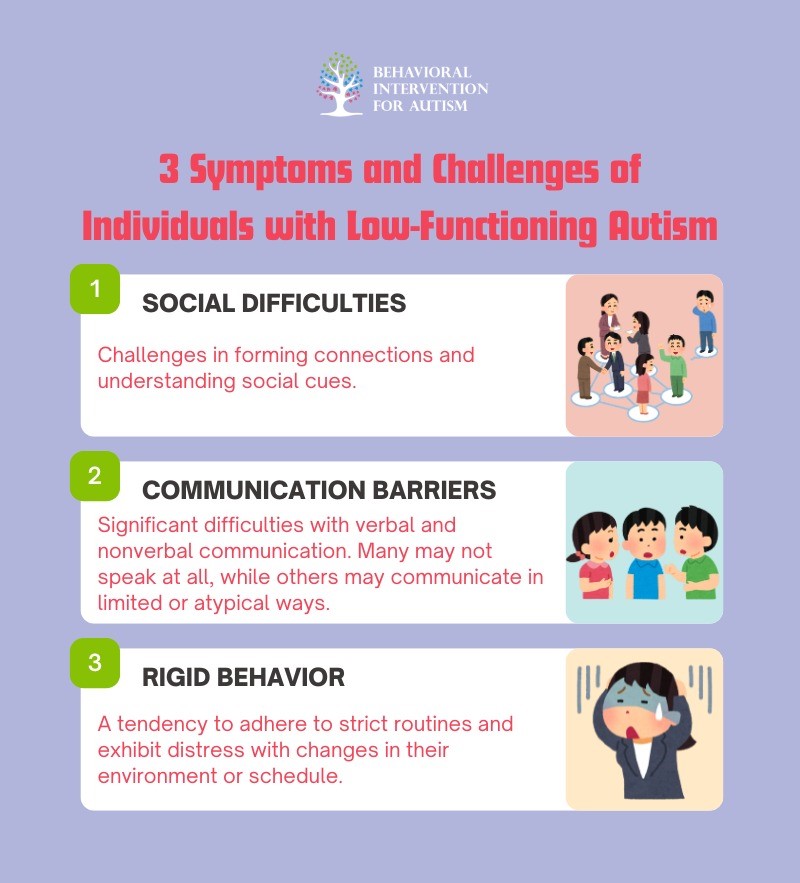
Table of Contents
Low-functioning autism refers to individuals diagnosed with Autism Spectrum Disorder (ASD) who exhibit the most severe symptoms associated with the condition. These individuals are classified as having Level 3 Autism, which indicates a significant level of impairment and a higher need for support in various aspects of daily life.
Definition and Severity Levels of Low-Functioning Autism
Low-functioning autism is characterized by challenges that impact an individual’s ability to function independently. Typically, those diagnosed with Level 3 ASD may struggle with various aspects of daily living and communications. They usually require lifelong support from caregivers or guardians.
3 Symptoms and Challenges of Individuals with Low-Functioning Autism
Individuals with low-functioning autism face numerous challenges in their daily lives. These challenges stem primarily from pronounced symptoms that affect their ability to communicate and engage with others. Common issues include:

Children diagnosed with this level of autism often require additional support in managing behaviors and achieving effective communication. They are also more likely to have comorbid conditions, such as Fragile X syndrome, tuberous sclerosis, and epilepsy.
Given their unique needs, it is essential for caregivers to provide an environment that is structured and supportive, which can aid in addressing some of these challenges effectively. Additionally, it’s worth noting that a significant percentage of children with autism—over 50%—tend to wander or elope, presenting safety concerns that caregivers must be vigilant about.
Comorbid Conditions of Low-Functioning Autism
Individuals diagnosed with low-functioning autism (LFA) often experience a range of comorbid conditions. Understanding these associated disorders is crucial for parents and caregivers as they navigate the unique challenges presented by LFA.
3 Associated Disorders
Children with low-functioning autism are more likely to have additional conditions that can complicate their overall development and care. Common associated disorders include:
- Fragile X Syndrome: A genetic condition that can lead to intellectual disability and developmental delays.
- Tuberous Sclerosis: A disorder that causes non-cancerous tumors to form in various organs, potentially affecting cognitive and physical development.
- Epilepsy: A neurological condition characterized by seizures, which can occur more frequently in individuals with autism.
The presence of these comorbid conditions can exacerbate the challenges faced by individuals with low-functioning autism, affecting their daily functioning and support needs.
Impact on Individuals
The impact of comorbid conditions on individuals with low-functioning autism can be profound. Children may struggle with daily living activities, often requiring help to complete tasks that others their age can handle independently.
Communication challenges are typically significant, affecting their ability to build relationships and express needs effectively. Delays in developmental milestones, such as learning to self-soothe or develop social skills, are common.
Understanding these aspects of low-functioning autism and associated conditions equips parents and caregivers with the knowledge needed to provide effective support and interventions for their loved ones.
Early Signs and Diagnosis of Low-Functioning Autism
Recognizing the early signs of low-functioning autism is essential for obtaining a timely diagnosis and ensuring that individuals receive the support they need. The signs of intellectual disability and the behavioral and social challenges common in low-functioning autism are outlined here.
5 Signs of Intellectual Disability
Individuals with low-functioning autism frequently exhibit early signs of intellectual disability. These can manifest in various ways, affecting their overall development and ability to engage in daily activities. Common signs include:
Sign | Description |
Delays in Motor Skills Development | Difficulty in achieving physical milestones such as crawling, walking, or running. |
Speech Difficulties | Challenges in developing language skills, which may lead to limited verbal communication abilities. |
Challenges in Daily Activities | Trouble with tasks such as dressing, eating, or personal hygiene that peers typically manage independently. |
Behavioral Problems | Increased tendencies to exhibit challenging behaviors, including tantrums, aggression, or self-injury. |
Difficulty Following Social Rules | Struggles in understanding social norms, which may lead to misunderstandings or inappropriate interactions. |
5 Behavioral and Social Challenges
In addition to the signs of intellectual disability, individuals with low-functioning autism often confront significant behavioral and social challenges. These challenges can hinder their ability to form relationships and interact effectively with others. Some common behavioral and social challenges may include:
Challenge | Description |
Communication Difficulties | Limited ability to express needs, feelings, or thoughts verbally, often resulting in frustration or miscommunication. |
Social Interaction Issues | Difficulty in making friends, sharing, or understanding social cues, which may lead to isolation. |
Rigid Routines | A preference for predictable schedules can result in distress when routines are altered, leading to behavioral outbursts. |
Sensory Sensitivities | Over- or under-responsiveness to sensory stimuli like sounds, lights, or textures, which can lead to discomfort and anxiety. |
Emotional Regulation Struggles | Challenges in managing emotions, often resulting in extreme reactions or withdrawal in social situations. |
Identifying these early signs and challenges is crucial in understanding “what is low-functioning autism” and recognizing the support that may be needed for effective intervention. Parents and caregivers play a critical role in monitoring development and advocating for appropriate resources.
Get the Support You Deserve Today!
If you’re seeking expert guidance and compassionate care, we’re here to help. At Behavioral Intervention for Autism, we provide personalized ABA therapy services tailored to meet the unique needs of every child. Our dedicated team focuses on building meaningful skills while creating a supportive environment for growth. We take pride in offering high-quality, evidence-based treatments that make a real difference. Don’t wait—reach out to us now and explore how our ABA programs in Florida can support your family. Let’s work together to help your child thrive.
Sources:
- 9 Common Obsessions of Children With Autism You Should Know - February 25, 2025
- What is Neurodiversity? A Guide to Embracing Differences - February 25, 2025
- Understanding Hyperfocus in Autism: What It Means and Why It Happens - February 25, 2025

